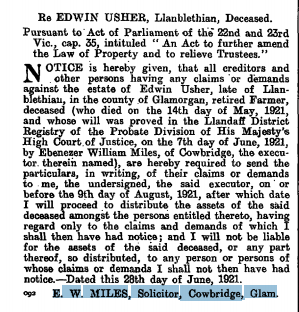Blue Monday is considered to be one of the most depressing days of the year for every-day working people.
It’s a day that often leads to self reflection, and encourages many to question life and relationship decisions, but more commonly work-related choices.
With that in mind employees across Wales could be contemplating handing in their notice of resignation this January 21. And CJCH Solicitors’ employment law expert Nigel Daniel revealed that the firm does traditionally experience an upturn in employment queries throughout January.
But where do employees stand legally if they make a snap decision to leave their job? Where do employers stand in this situation? And what happens next?
Here, Mr Daniel answers all the questions that discontented employees, and their employers, may have this Blue Monday.
 Do you see an upturn in queries to the Employment Team on Blue Monday/ or during January?
Do you see an upturn in queries to the Employment Team on Blue Monday/ or during January?
It is usually the position as far as this firm is concerned, that we see an upturn in relation to Employment Law in the month of January, however this year there has actually been a decline at CJCH.
What sort of issues is the employment team contacted about?
At this time of year, there are the inevitable enquiries about incidents arising out of Christmas Parties. From the employer’s perspective, we have instructions regarding the implementation of disciplinary procedures, enquiries from new start-ups and unfortunately in this present uncertain economic climate, queries regarding redundancies and procedures that have to be followed.
Regarding the issue of Blue Monday and employees it may very well be the position, that if and when an employee decides to leave, we may have enquiries both from the employer and the employee regarding the possible impact of post-employment agreements.
What is the most common problem people contact your team regarding?
The Employment Team in CJCH, undertakes a broad spectrum of work involving both contentious and non-contentious Employment Law matters. We are frequently instructed to prepare company handbooks, advice on disciplinary and grievance procedures and all aspects of family friendly policies.
On the contentious side of matters, the introduction of Section 111(a) Protected Conversations, means that we are frequently asked to try and negotiate exit packages for employees by both the employee and the employer. In addition, of course, we are always instructed to act on matters involving unfair dismissals, wrongful dismissal and areas of discrimination.
The increasing awareness of the Me Too campaign has led to an increase of enquiries from female employees who have suffered the indignity of unwarranted attention of a sexual nature.
What are the options for someone who wanted to leave a job with immediate effect and not give notice?
Most responsible employers will have in place contracts of employments for their employees which will give a clear indication of what notice the employee is entitled to, whether or not it is contractual or statutory. In addition, most contracts of employment will give a clear indication of what period of notice an employee is required to give the employer.
It is the position, that even when there is no formal contract of employment, the employer is under a statutory obligation to provide an employee with a written statement of the main terms and conditions of his/her employment within two calendar months of starting work. This should also include the notice provisions.
If therefore, there is no contract of employment or for that matter a Section 1 Statement of Terms and Conditions, the Employment Rights Act lays down the minimum period of notice required from an employee, that is one week.
It may very well be the position, that an employee who wishes to leave a job with immediate effect can agree with his employer to waive the notice period.
If however the employee leaves his job without giving notice, and without the agreement of the employer, a number of situations may arise.
- It may very well be the position, that post-termination restrictive covenants are in place and the employer may very well seek injunctive relief to prevent the employee starting employment with a new employer if, there is a risk that the post-termination restrictive covenants would be breached.
- It may also be the position that the employer is concerned about the breach and can refuse to accept the employee’s repudiation and request that he/she sits out the notice period at home.
- It is also possible for an employer to seek damages against an employee who leaves in breach of notice provisions if it can be shown a financial loss has arisen. However, circumstances such as these are very rare, as quantifying loss is difficult.
Can someone leave during a probationary period and what would they need to consider?
Leaving during a probationary period, has very similar consequences as above.
The main difference of course, is that an employee who wishes to leave during a probationary period is usually in the position of finding out, that he is not suited or does not like the post he has taken.
There are very rarely any circumstances, where an employer would seek to take action in such circumstances, other than possibly where the employer has paid for the employee to attend training courses prior to commencement of his employment and/or during the probationary period.
In those circumstances, there may be a recoupment provision. In addition, notwithstanding the fact that an employee is in a probationary period, he may have gained confidential information which again may be subject to post-termination restrictive covenants.
What if a staff member is on Maternity Leave? What would they need to do to change jobs?
If a member of staff is on Maternity Leave, and wishes to change jobs, then the Maternity and Parental Leave Regulations provide that the female employee is bound by the contractual obligation to give notice to terminate her employment.
So a woman on Maternity Leave who decides not to return to work must advise her employer before the end of her leave period, either by a notice period which is contained in a Contract of Employment, or by the Statutory Minimum of one week under Section 86 of the ERA.
What industries do you generally get the most queries of this nature from?
Most enquiries at this time of the year are generated from the care industry, retail, health care and security industries.
What is your top tip to anyone who might be spurred on to change jobs from Blue Monday?
Any Employee who is minded to change jobs under the Blue Monday syndrome, should consider a number of issues.
Firstly, it may very well be the position that they have more than two years continuity of service. To leave therefore, would mean starting again and losing all employment rights that have been gained through having two years continuity of service.
In addition, any employee minded to leave and change jobs must also be acutely aware of any contractual provisions relating to the dissemination of confidential information, and of course post-termination restrictive covenants.
If the situation has arisen where the employee for some reason has become dissatisfied with his/her role, then possibly speaking to the HR Department or a line manager to discuss areas of dissatisfaction may resolve a problem.
CJCH Solicitors’ employment team is highly experienced and skilled in all aspects of employment law and the provision of HR legal services.
It supports a wide range of employers from SMEs to household name companies, universities and public sector organisations.














 An estimated 50% of private landlords in Wales have yet to apply to
An estimated 50% of private landlords in Wales have yet to apply to 


